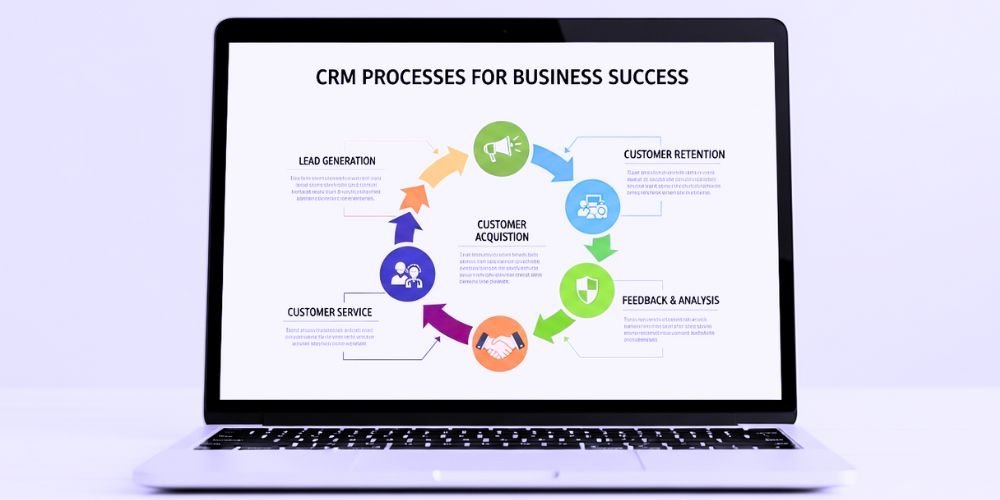Organizations recognize the critical importance of nurturing strong customer relationships in the customer-centric era. Customer Relationship Management (CRM) processes provides a systematic approach to managing customer interactions and engagements throughout their journey. This article explores CRM processes’ significance, key components, and impact on customer-centric strategies.
Understanding CRM Processes
CRM processes involve a series of activities and strategies to build and maintain strong customer relationships. These processes encompass the entire customer lifecycle, from prospecting and acquisition to retention and loyalty. They are supported by technology solutions that facilitate data management, customer segmentation, communication, and analysis. The ultimate goal is understanding customer needs, delivering personalized experiences, and maximizing customer value. Organizations can enhance customer satisfaction, improve retention rates, and drive business success by implementing effective CRM processes.
Key Components of CRM Processes
When it comes to CRM processes, there are a few key components that are essential for success. First and foremost, having a solid database of customer information is crucial. It includes contact information, preferences, and purchase history.
Customer Data Management
Effective CRM processes rely on robust customer data management. It involves capturing and organizing customer information, such as contact details, purchase history, preferences, and interactions across multiple touchpoints. Centralized databases or CRM software systems enable organizations to view each customer, facilitating personalized interactions comprehensively.
Customer Segmentation
Segmentation is a vital component of CRM processes. By categorizing customers into distinct groups based on shared characteristics or behaviors, organizations can tailor their marketing and communication efforts to specific segments. Segmentation enables targeted messaging, personalized offers, and tailored experiences that resonate with customers and foster loyalty.
Lead Generation and Prospecting
CRM processes encompass lead generation and prospecting strategies. Organizations employ various tactics, such as marketing campaigns, advertising, referrals, and social media engagement, to attract potential customers. CRM systems facilitate lead tracking, qualification, and nurturing to convert prospects into loyal customers.
Sales and Opportunity Management
They support sales and opportunity management. It involves tracking sales interactions, managing pipelines, and forecasting revenue. CRM systems give sales teams visibility into customer data, enabling them to prioritize leads, identify cross-selling or upselling opportunities, and streamline the sales process.
Customer Engagement and Communication
CRM processes facilitate proactive customer engagement and communication. Organizations can foster ongoing relationships with customers through personalized messaging, email campaigns, social media interactions, and targeted promotions. CRM systems enable automated communication workflows, ensuring consistent and timely engagement across multiple channels.
Customer Service and Support
CRM processes extend to customer service and support functions. Organizations leverage CRM systems to manage customer inquiries, complaints, and requests. CRM software enables efficient ticketing, case management, and tracking of customer interactions, enabling timely and effective issue resolution. It fosters customer satisfaction and loyalty.
Customer Analytics and Insights
They rely on data analysis and reporting to gain valuable insights into customer behavior, preferences, and trends. CRM systems provide analytics capabilities that allow organizations to track customer interactions, measure campaign effectiveness, and identify opportunities for improvement. Data-driven insights inform strategic decision-making and drive continuous improvement.
The Impact of CRM Processes
Effective implementation of CRM processes can significantly impact a company’s success in building lasting relationships with customers and improving overall business performance.
Enhanced Customer Satisfaction
CRM processes enable organizations to deliver personalized experiences and tailored solutions to customers. Organizations can provide proactive and responsive support by understanding customer preferences, needs, and pain points, resulting in higher customer satisfaction and loyalty.
Improved Sales Performance
Effective CRM processes enhance sales performance by providing sales teams with a holistic view of customer data. It enables better lead management, targeted selling strategies, and improved customer engagement. Sales teams can leverage CRM insights to identify cross-selling or upselling opportunities, resulting in increased revenue.
Increased Customer Retention
CRM processes play a pivotal role in customer retention. Organizations can foster loyalty and reduce churn by nurturing customer relationships, addressing concerns promptly, and delivering exceptional experiences. Repeat customers are more likely to generate long-term revenue and act as brand advocates.
Targeted Marketing and Personalization
They enable organizations to implement targeted marketing campaigns based on customer segmentation and preferences. Personalized messaging and offers resonate with customers, leading to higher response rates and improved marketing ROI. By leveraging CRM insights, organizations can refine their marketing strategies and deliver more relevant content to customers.
Data-Driven Decision-Making
They provide organizations with valuable data and insights that drive data-driven decision-making. Organizations can identify trends, preferences, and patterns that inform marketing strategies, product development, and customer service improvements by analyzing customer data. It leads to more effective business strategies and better alignment with customer needs.
Conclusion
CRM processes are instrumental in building and maintaining strong customer relationships. By effectively managing customer data, implementing targeted marketing strategies, nurturing leads, and delivering personalized experiences, organizations can enhance customer satisfaction, increase retention rates, and drive business success. CRM processes encompass a range of activities, from data management and segmentation to sales management and customer support. Leveraging CRM systems and analytics enables organizations to make informed decisions, optimize customer interactions, and cultivate long-term customer loyalty. They embrace CRM processes as part of a customer-centric strategy that positions organizations to thrive in a competitive marketplace and deliver exceptional customer experiences.













